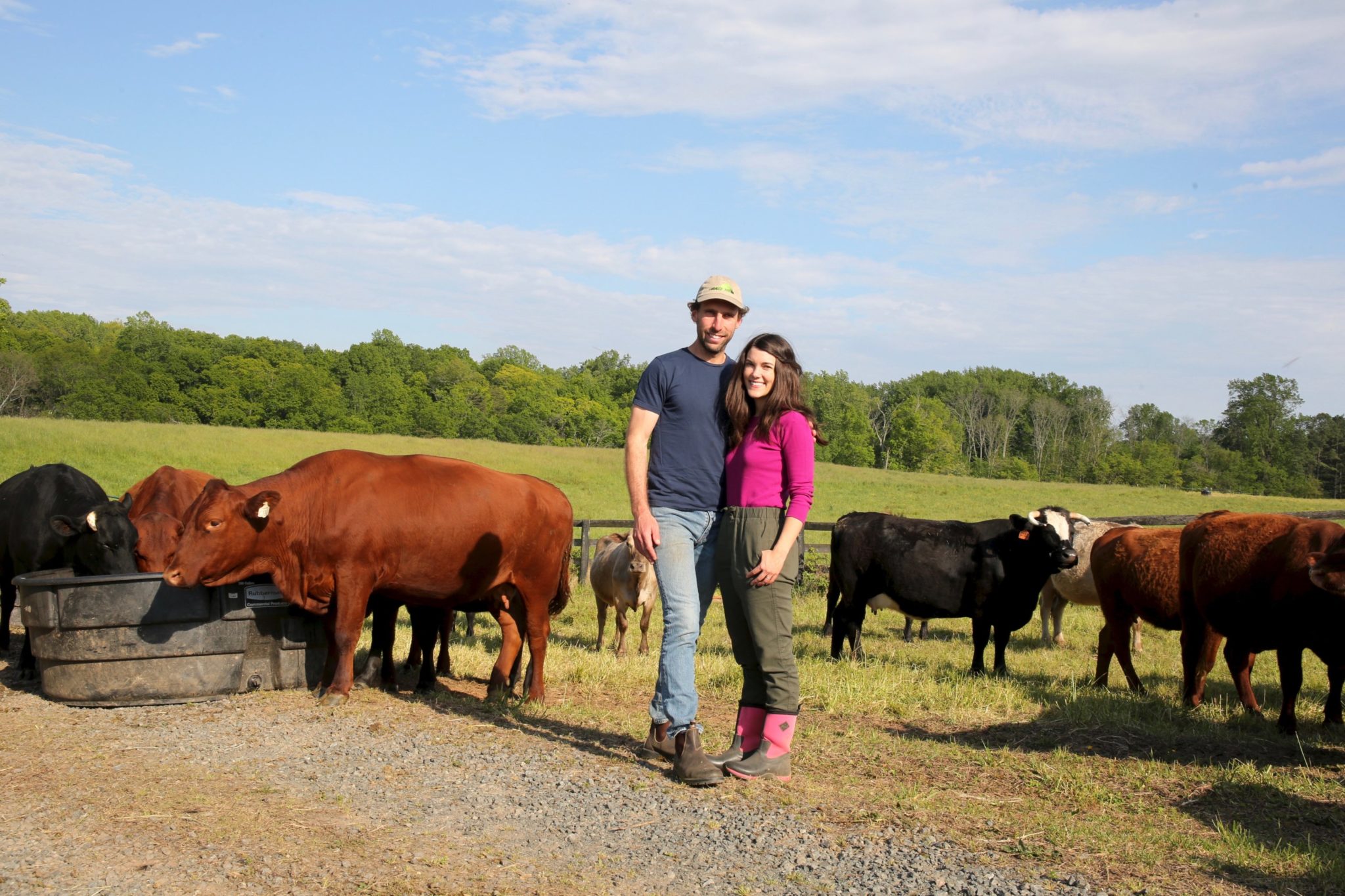Over the course of six seasons, the Netflix documentary series Chef’s Table has become a phenomenon due to its intimate, behind-the-scenes portrayals of food-world personalities. One of its star directors is also its youngest: 34-year-old filmmaker Abigail Fuller, who oversaw acclaimed episodes such as the one on Savannah chef Mashama Bailey. Fuller was based in Los Angeles when she started working on the series, living the life of a rising documentarian.
But five years later, things have taken an unexpected turn: She now spends her days on a cattle ranch in rural Virginia. Along with her husband, Matthew Rales, Fuller runs a 1,500-acre regenerative farm that has provided grass-fed beef to high-end restaurants like Blue Hill at Stone Barns, outside New York City. And in the Covid-19 era, the couple has launched a burgeoning delivery business for home dwellers eager to bypass the troubled industrial-meat supply chain—another wrinkle in an unusual journey.
Fuller’s path from LA to Fauquier County began, she says, in Slovenia. The director visited the country in 2015 to shoot her first Chef’s Table episode, about a back-to-the-land restaurateur named Ana Roš. “When I went to Slovenia, the seed was planted for this lifestyle,” Fuller recalls. “We were making cheese, harvesting lunch from the garden. It was feeling connected to your food. Something clicked.”
Earlier this year, I made the 90-minute drive to Fuller and Rales’s APD Farm, near Warrenton, to find out what it’s like to be a renowned-filmmaker-turned-rancher. The couple greeted me in a spattered Toyota pickup truck redolent of mud and coffee, their Pyrenean-shepherd mix, Charlotte, in back. We bumped along a winding road flanked by a goose-filled pond, grassy pastures, and forested thickets. While neighbors’ plots are tidy divisions of soy and corn, APD turned out to be a sprawling manmade wilderness, primed for herds of cows and donkeys to graze through, mimicking the ecological habits of ancient herbivores. “We’re putting back more than we’re taking—more insects, more water, more wildlife,” said Rales, gesturing to the decidedly unmanicured field in front of us. “It’s agriculture that adds to the environment instead of taking away.”
The couple, who married in Kenya last year, complement each other well. Rales—the lanky, soft-spoken son of local billionaire Mitchell Rales, of Glenstone museum fame—is apt to rhapsodize on wonky topics like grassland ecology. Fuller, petite and outgoing, often jumps in to help translate. (“Abby is helping me improve my storytelling beyond technical nerdiness,” he says, laughing.) When we met several weeks before the shutdown started, she was arranging a dinner at their home—a gathering that included a local chef, an herbalist, a farm manager, and other young ex-urbanites. “We’re building our own community,” said Rales. “It’s something you have to do out here.”
When the two connected in 2016, they were living opposite lives. Fuller was traveling the globe to shoot and promote her film work, while Rales had just bought what would become APD, at the time a defunct horse farm. After mutual friends decided they should connect, they chatted on the phone for four months before finally meeting in DC, where they went on dates at Ethiopic and Bad Saint. Fuller then visited Rales’s farm. “I remember being so in awe,” she recalled. “It was a perfect day.”
“Another perfect day” became a mantra for the couple and, later, the name of their farm: APD.
While Fuller, an upstate New York native, gravitated toward cities like Brooklyn and LA, Rales had been drawn to agrarian life early on. His Bullis ’02 yearbook photo shows him wrangling sheep at his family’s Potomac horse farm. He graduated from Middlebury College with degrees in environmental science and literature and spent three years working at Polyface farm in Swoope, Virginia, with Joel Salatin—a star in the regenerative-farming world and the central character of Michael Pollan’s bestselling book The Omnivore’s Dilemma.
Rales embraced Salatin’s environment-first philosophies and founded his own operation, Potomac’s Grassential Farm, in 2010. The ten-acre plot supplied grass-fed beef, lamb, and rabbit to top DC restaurants such as Komi and Marcel’s. But it was tiny and, by nature, low-impact. With his new farm, Rales began scaling up—tearing down whiteboard fences and letting pastures grow wild.
APD essentially runs on grass: no grain, very small hay reserves, and few costly fossil fuels. “The grass feeds the animals, and the animals feed the grass,” said Fuller, who has used her enthusiasm for Rales’s farming methods to become a vocal spokesperson for their holistic style of beef. At the same time, their clientele has grown, with a large portion of their product going (pre-shutdown) to Hardwick Beef, a grass-fed distributor for New York restaurants and butcheries. DC, while a steakhouse town, has never been big on 100-percent-grass-fed meat, which some diners incorrectly think of as tough or gamy.
It took the pandemic to drum up significant local demand for APD beef. Home cooks used to hesitate to splurge on a freezerful of steaks, ground meat, and off-cuts (and the farm’s no-waste, whole-animal model means packages come with a little of everything). Now, with the supermarket beef supply affected by Covid, customers are more open to storing large quantities from a small area producer. APD’s wares aren’t cheap by grocery-store standards, but they’re a good value for high-quality bulk: Packages start at $99, or you can buy an eighth of a cow for $500. The farm plans to launch an online marketplace with regular deliveries to the Washington area.
Currently, they’re taking four steers per month to small slaughterhouses, but that’s still not enough to keep up with orders—especially as the processing facilities are backed up due to high demand. Young families in places like Takoma Park—“alternative-minded” populations, Rales says—are especially drawn to their products, but Fuller and Rales have been delivering all over, from Falls Church to Southeast DC. When the couple was making personal, free deliveries for the first few pandemic months, the daily routine was tough—literally waking with the chickens for farm work and then driving 200 miles a day. But Fuller says that “doing deliveries ourselves is such a rewarding thing—knowing everything we’ve put into the animal, knowing that someone will appreciate the food and that animals are helping heal the land.”
After showing me around the fields, Fuller and Rales drove over to their home, a white 1862 farmhouse with a cozy porch just begging to be read on. They led me to their wood-beamed kitchen stocked with jars of tomatoes that Rales and Fuller had grown in their garden. The whole setup is an urbanite’s dream of what rural Virginia farming should be—an idyllic escape fantasy for anyone fed up with city living.
When Fuller moved to the farm in 2017, there was a moment when she thought she might never go back to her old life. “If I decided I didn’t want to make films anymore and wanted to get into something else, I gave myself permission,” she said. “But [rural life] has only reinforced how much I love filmmaking.” As a result, she now splits her time between farming and filming. Last fall, she won a grant to make a documentary about a shepherd in central California who’s fighting wildfires with her grazing practices. “Food, farming, and feminism are kind of my sweet spot,” Fuller says.
At some point, when post-pandemic life resumes, she’s slated to work on season eight of Chef’s Table, and she’s involved in another documentary series, for the Apple TV+ platform, Dear . . ., for which she filmed an episode with Oprah Winfrey. Of course, there’s one obvious story that would be a great subject for a documentary: A plugged-in young couple moves to the country to raise cattle and get back to the land. Would Fuller ever want to document APD’s own tale?
“I haven’t had the desire to tell it yet,” she says. “It’s hard to think your own life is interesting. I think everyone else’s lives are interesting. For now, living it is good enough.”







